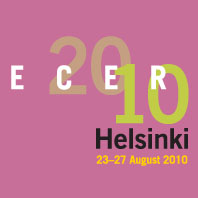A Global Society; Implications for Education and Educational Research
Chair: Theo Wubbels, Utrecht University, WERA symposium committee
Discussant: Fazal Rizvi Center for Global Studies, University of Illinois
Presenters:
Beatriz Álvarez González, Faculty of Education, Spanish National University of Distance Education
Transnational families. The role of schools to uphold educational processes
Martha Montero-Sieburth Institute for Migration and Ethnic Studies,University of Amsterdam
Understanding Culture and Youth within Educational Institutions: Beyond Cultural Definitions to Cultural Change Contexts
Ingrid Gogolin, Universität Hamburg
How can Educational Research contribute to Equal Educational Opportunities in a Global Society?
Summary
A global society put high demands on its participants. Educational research can and should help cope with these demands. In this symposium sponsored by the Word Educatioanl Research Association (WERA) three scholars from different countries give examples of what educational research ahs to offer.
The contribution of Álvarez’ discusses migrant families who are living apart in different countries: transnational families. These families have to continue the education of their children despite the family separation, while facing huge challenges: knowing and understanding a new culture, looking for jobs, and trying to adapt to the host society. Transnational families have to accommodate family separation with the need to keep family ties. These families feel barriers to their children’s education, such as lack of economical resources and time constraints. On their part, teachers of classrooms with children from transnational families may offer more effective support if they increase awareness of these family’s circumstances and needs. Álvarez tries to explore the resources and strategies developed by schools to support these families, and to enable closer work with them. As a case she will focus on transnational Ecuadorian families which are living and working in Spain while their children remain in Ecuador.
The presentation by Montero addresses the ways in which cultural change has been thought of in the education of immigrant children and in particular social science research to explain the academic achievement of different ethnic groups in different contexts. Central questions undergirding this presentation are: How do educational institutions reproduce “culture”, and specifically what and whose ¨culture¨? How are youth within such institutions simply not products of culture, but producers of culture? Montero uses her research on Latino students in the U. S., intercultural educational policies in Spain and integration policies in the Netherlands and work in Spanish and Dutch schools. She focuses on the explanations of culture versus structure in the social mobility and school attainment of immigrants that are part of the current European debate. She draws parallels and cites differences between these explanations and their value for European educational research. She explains how youth’s local cultures and identities can be ignored, suppressed, reinvented or extended and raises questions about how cultural changes can be integrated into education practice and research.
Gogolin’s contribution focuses on education inequality in the context of international mobility and the manifold practices of migration. Migration affects the education systems worldwide in a specific manner. Migrants are young, and migrants have children. In most immigration countries of the world, the age distribution within the immigrant population is similar to the example of Germany. Here, about 65% of all immigrants are below 40. In the population as a whole, less than 30% are below that age. Because of this fact, the educational sector is highly responsible for social cohesion in immigrant societies. Unfortunately though, migration turns out as a severe handicap for educational success in most education systems, especially in Europe. Gogolin will present research results indicating features of education systems which – often unintentionally – contribute to unequal opportunities of migrants in education, and will give an outlook on education research strategies which might contribute to overcome this situation.
